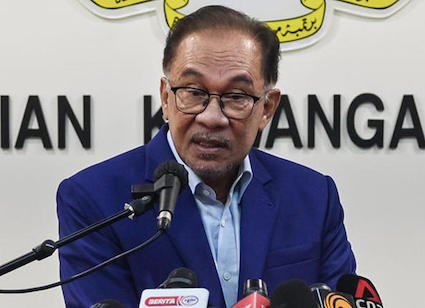Cukuplah on the advisors: the new Anwar administration is floundering

The Anwar administration needs PEMANDU
Murray Hunter
Distributing tampons as a poverty eradication measure, and using an app dashboard to solve vegetable shortages are both measures that are not going to solve critical problems facing the nation at present.
The new Anwar administration is floundering. Instead of offering sound strategies to curb inflation, consumers are told to not to buy goods from retailers which charge high prices.
The reality is that some ministers, after two months haven’t found their own offices yet. There is a lot of inexperience and naivety in Anwar’s ministry. Some don’t know what to do, which is causing Anwar headaches. Anwar can’t solve every minister’s problems.
There are even calls from some sections of the community for certain ministers to be sacked and replaced.
It appears the primary criteria for being a member of cabinet was loyalty. Knowledge, experience, and expertise was only a secondary consideration.
Then came the pro bono relatives taking up advisory roles. This has been supplemented with an economics advisory board, (overlapping?), made up of establishment experts, who live and work within the ‘bubble’. This is not the best recipe for finding new approaches and paradigms for the nation’s developmental trajectory. If you come from a GLC, you are likely to think of GLCs.
It looks like the Anwar administration will become one congested with advisors, consultants, and advisory boards that will bog down process, and keep the Malaysian economy stuck in the same position it is in now.
The modus operandi of government will be ‘have a problem appoint some pro bono advisor’. The problem with pro bono is that it comes without any accountability.
It’s time to look for new ideas
Malaysia doesn’t have to look too far. The Performance Management and Delivery Unit, or PEMANDU could be reconstituted (with some modifications). It was formed in 2009, and placed under the Prime Minister’s Office. It was recognized as a good innovation in public administration, at the time.
The objective of PEMANDU was to forge a sustainable and inclusive socioeconomic transformation at the time. PEMANDU was intended to be a catalytic approach to achieving a transformation of the civil service.
A reconstituted, hybrid PEMANDU could have the mission of evaluating particular problems faced by ministries, analyse these problems through situations audits, which include consultations with the community and stakeholders, determine a range of solutions, evaluate them and oversee the implementation. Solutions will have contingencies, should there be unforeseen barriers.
Malaysia is blessed with a wide and diverse talent pool of retired academics, researchers, civil servants, and business people. The general expertise to solve the nations problems are already within the community. Many of these people are only too willing to help the nation.
PEMANDU needs to be on the ground, within communities, rather than in the seminar rooms of five star hotels in Putra Jaya. These people could empower ministers to solve their respective portfolio problems.
Malaysia needs a bottom-up approach, rather than rely of top-down pro bono advisors. This could help prevent a policy malaise, where advisors just come up with the same old solutions.

